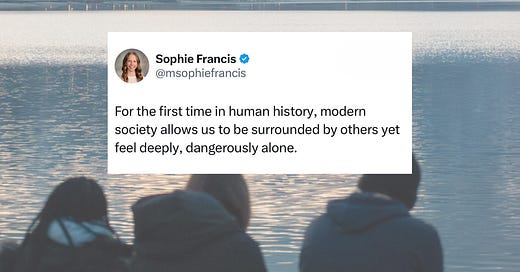The Lost Art of Belonging (How to Reclaim Human Connection For Greater Health + Happiness)
Humans evolved to thrive in groups, but the modern world took that away. Here’s how to get it back.
The Problem
Modern society comes with many plusses.
With a few taps of the thumb, we can contact someone on the other side of the globe. We have cars and highways and paved roads and airplanes that allow us to travel great distances comfortably and quickly.
With the touch of a finger, we can have food delivered right to our doorstep. With a single phone call, a mechanic or electrician can come fix nearly every problem in your home in a day’s work. (Or, you could just YouTube it, because you can learn to do everything on the internet these days, right?)
We’re more connected than ever.
Life is easier than ever.
Then why do we feel so lonely?
It’s only in today’s world that you can be surrounded by people yet feel deeply, dangerously alone.
Early humans would almost never have been alone.
But since the advent of agriculture, humans slowly became more independent and less reliant on each other to survive. With agriculture and industry came the accumulation of personal property. Food could be stored, animals domesticated, and tools privately owned.
Slowly but surely, individuals and their families could stay alive without relying much on communal sharing. Independence increased alongside social hierarchies and wealth inequality.
Interdependence diminished.
Tightly-knit communities—the group of people whom you would help feed and help defend—became something of the past.
Today, we’re more independent than ever before.
We’re no longer a part of a tribe of people working together towards a common goal.
This has not come without great consequences. You see, in a society where we’re no longer connected—and it can feel like you’re no longer needed—we lose what it means to be human.
Sebastian Junger, author of Tribe, said:
“Solidarity is at the core of what it means to be human.”
Without solidarity, we’re disconnected. We can go through an entire day feeling—or even truly being—unseen by another human soul.
In early human tribes, your actions were always known by group members.
Good actions that enhanced the collective wellbeing of the group were affirmed and rewarded. Bad actions—such as not taking care of yourself or others—would be punished by the group.
Cooperation can’t occur without people encountering each other and supporting good behaviors.
Today, we are no longer required to demonstrate a commitment to the collective good so we are accepted in our groups.
Without solidarity, competition replaces compassion
Remember I mentioned life being (seemingly) easier and more convenient than ever before?
Like the lack of solidarity, that’s not doing us any good.
Humans thrive on hardship.
Interestingly, history has shown that times of war bring people together. Charles Fritz studied this, and found that mental health improved during periods of war and disaster.
Fritz found that in times of disaster and existential threats:
“Class differences are temporarily erased, income disparities become irrelevant, race is overlooked, and individuals are assessed simply by what they are willing to do for the group” (Junger).
With adversity often comes unity, cooperation, and altruism.
Shared experiences of hardship can reduce feelings of isolation, despair, and increase social support.
Modern society doesn’t seem all that cushy and convenient any more.
We need to change the system.
According to the self-determination theory (SDT), us humans have three core needs to feel content in life:
Autonomy—to feel authentic and in control of your actions and values
Competence—to feel capable and effective at what you do
Relatedness—to feel connected to others
Here’s how you can implement the SDT in your own life to start living more like your ancestors and less like your modern counterparts:
Keep reading with a 7-day free trial
Subscribe to Well on Your Way: Mental Health + Metabolic Science to keep reading this post and get 7 days of free access to the full post archives.






